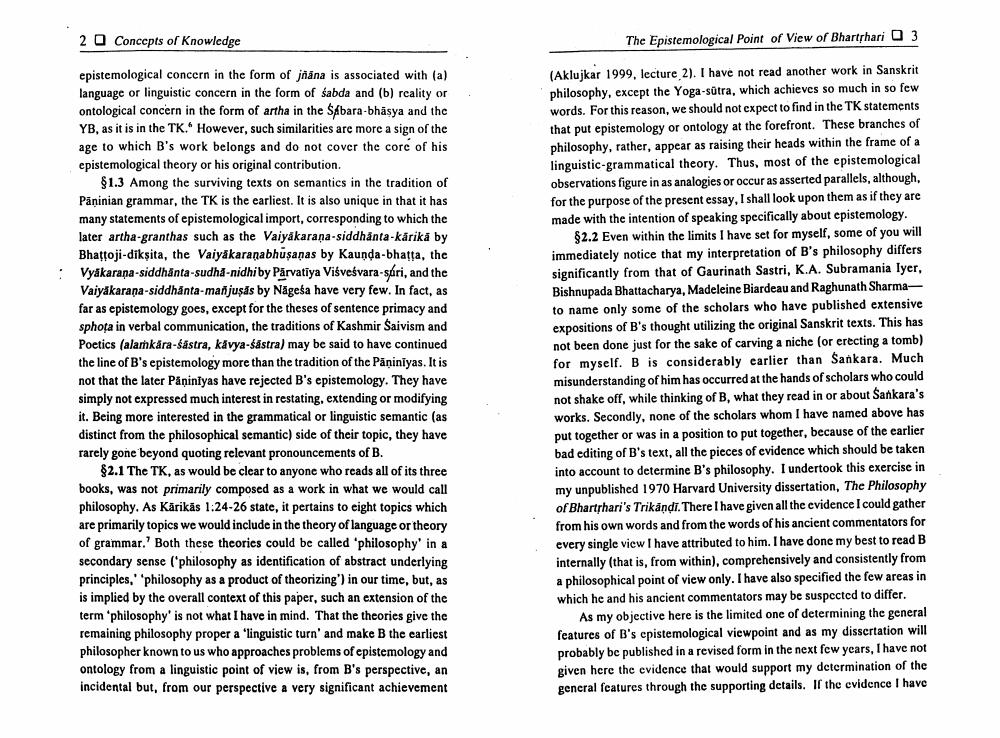Book Title: Epistemological Point Of View Of Bhartrhari Author(s): Ashok Aklujkar Publisher: Ashok Aklujkar View full book textPage 2
________________ 2 Concepts of Knowledge The Epistemological Point of View of Bharthari O 3 epistemological concern in the form of jnana is associated with (a) language or linguistic concern in the form of Sabda and (b) reality or ontological concern in the form of artha in the Sabara-bhasya and the YB, as it is in the TK." However, such similarities are more a sign of the age to which B's work belongs and do not cover the core of his epistemological theory or his original contribution. 31.3 Among the surviving texts on semantics in the tradition of Pāņinian grammar, the TK is the earliest. It is also unique in that it has many statements of epistemological import, corresponding to which the later artha-granthas such as the Vaiyakarana-siddhanta-karika by Bhattoji-diksita, the Vaiyakaraṇabhusaņas by Kaunda-bhata, the Vyakarana-siddhanta-sudha-nidhi by Parvatiya Visvešvara-sári, and the Vaiydkarana-siddhanta-mañjuşās by Nägesa have very few. In fact, as far as epistemology goes, except for the theses of sentence primacy and sphofa in verbal communication, the traditions of Kashmir Saivism and Poetics (alarkara-sastra, kavya-śāstra) may be said to have continued the line of B's epistemology more than the tradition of the Paniniyas. It is not that the later Paniniyas have rejected B's epistemology. They have simply not expressed much interest in restating, extending or modifying it. Being more interested in the grammatical or linguistic semantic (as distinct from the philosophical semantic) side of their topic, they have rarely gone beyond quoting relevant pronouncements of B. $2.1 The TK, as would be clear to anyone who reads all of its three books, was not primarily composed as a work in what we would call philosophy. As Karikas 1:24-26 state, it pertains to eight topics which are primarily topics we would include in the theory of language or theory of grammar.' Both these theories could be called 'philosophy' in a secondary sense ('philosophy as identification of abstract underlying principles, philosophy as a product of theorizing') in our time, but, as is implied by the overall context of this paper, such an extension of the term 'philosophy is not what I have in mind. That the theories give the remaining philosophy proper a 'linguistic turn' and make B the earliest philosopher known to us who approaches problems of epistemology and ontology from a linguistic point of view is, from B's perspective, an incidental but, from our perspective a very significant achievement (Aklujkar 1999, lecture 2). I have not read another work in Sanskrit philosophy, except the Yoga-sútra, which achieves so much in so few words. For this reason, we should not expect to find in the TK statements that put epistemology or ontology at the forefront. These branches of philosophy, rather, appear as raising their heads within the frame of a linguistic-grammatical theory. Thus, most of the epistemological observations figure in as analogies or occur as asserted parallels, although, for the purpose of the present essay, I shall look upon them as if they are made with the intention of speaking specifically about epistemology. $2.2 Even within the limits I have set for myself, some of you will immediately notice that my interpretation of B's philosophy differs significantly from that of Gaurinath Sastri, K.A. Subramania Iyer, Bishnupada Bhattacharya, Madeleine Biardeau and Raghunath Sharmato name only some of the scholars who have published extensive expositions of B's thought utilizing the original Sanskrit texts. This has not been done just for the sake of carving a niche (or erecting a tomb) for myself. Bis considerably earlier than Sankara. Much misunderstanding of him has occurred at the hands of scholars who could not shake off, while thinking of B, what they read in or about Sankara's works. Secondly, none of the scholars whom I have named above has put together or was in a position to put together, because of the earlier bad editing of B's text, all the pieces of evidence which should be taken into account to determine B's philosophy. I undertook this exercise in my unpublished 1970 Harvard University dissertation, The Philosophy of Bharthari's Trikandi. There I have given all the evidence I could gather from his own words and from the words of his ancient commentators for every single view I have attributed to him. I have done my best to read B internally (that is, from within), comprehensively and consistently from a philosophical point of view only. I have also specified the few areas in which he and his ancient commentators may be suspected to differ. As my objective here is the limited one of determining the general features of B's epistemological viewpoint and as my dissertation will probably be published in a revised form in the next few years, I have not given here the evidence that would support my determination of the general features through the supporting details. If the evidence I havePage Navigation
1 2 3 4 5 6 7 8 9 10
